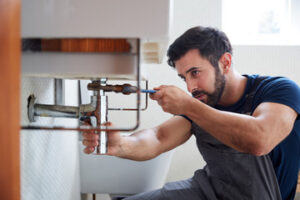Backflow testing is vital to make sure that the water supply is clean and sanitary. Nobody wants sewage water in their drinking water, which is full of nasty bacteria, viruses, and parasites.

The backflow test involves closing valves and checking gauges for changes in pressure. This catches imbalances in water pressure that cause backflow problems. Contact Plumbers In Cleveland Ohio for professional help.
Plumbing installations are the foundation of a home’s water supply and waste management systems. They require a significant amount of work and skill to ensure that all the components are properly connected, sealed, and tested. Licensed plumbers have the experience and knowledge to install plumbing systems correctly and meet all local building codes and standards.
Before any plumbing installation begins, the plumber will review the project with the homeowner to understand what is needed. They will then take measurements and determine where the pipes will be routed. This helps to avoid any surprises once the rough-in stage begins. Once the piping is laid out, the plumber will cut and join the pieces of pipe together using a variety of tools.
Some of these tools include pipe wrenches, flaring pliers, tubing cutters, power shears, a pipe bending machine, dies, and soldering torches. Once all the pipes are joined, they will be inspected to make sure there are no leaks and that they are fitted tightly.
Other types of plumbing installation include gas lines and drain lines. Gas lines bring in natural gas for heating and cooking, while drain lines transport wastewater out of the home. Both of these types of lines must be installed according to specific building codes to ensure safety and efficiency.
Once the initial plumbing installation is complete, the plumber will test all aspects of the system to make sure it is working correctly and meets all local building codes. This includes checking for leaks, ensuring there is proper water pressure, and making any necessary adjustments. Plumbers can also perform routine maintenance on water heaters, including cleaning drain lines and repairing any issues with the temperature or flow of hot water. Regular maintenance can help prevent costly problems in the future and extend the lifespan of the unit.
Plumbing Repair
Plumbing repair is a big part of a plumber’s job. It includes everything from fixing leaks to clogs and more. Many plumbing problems are easy to prevent with regular maintenance, such as cleaning out drains and checking for any water leaks or damage to pipes. Occasionally, homeowners will experience more serious issues that require a professional plumber’s attention. Leaky faucets, faulty showerheads, and dangerously high water bills are just a few common issues that plumbers fix for their clients.
Getting the plumbing repairs done correctly is vital for keeping your home or business running smoothly and efficiently. This is why it’s important to hire a licensed plumber for moderate to major plumbing concerns instead of trying to DIY them. Professionals have the tools and materials needed to complete the job quickly and safely, and they understand how to properly use them to avoid costly repairs in the future.
The most common plumbing problems that require repair are leaking faucets, clogged drains and toilets, and dripping pipes. Plumbers often work on-call for emergency services, so they can respond to these issues as soon as possible and minimize the damage. They may also advise their clients on how to keep their plumbing in good working condition, such as installing energy-efficient appliances and water-saving fixtures.
A plumber will often need to repair or replace components in the water supply system, such as kitchen sinks, overhead storage tanks, bathroom tanks and pipes. They can also install water heaters, hot tubs and other appliances that use or produce water. They are also responsible for repairing or replacing sewer lines and household drains.
The most common plumbing problems that need repair are leaking faucets, clogged sinks and toilets, and dripping or broken pipes. These issues can lead to expensive water bills and potential damage to your home’s structure if not addressed promptly. Fortunately, these problems are relatively easy to fix for a plumber, especially if you catch them early on. Investing in regular maintenance and keeping an eye on your plumbing can help prevent these problems from occurring.
Plumbing Maintenance
Plumbing maintenance is the process of regularly checking and repairing your home’s plumbing systems and fixtures to ensure they are working correctly. It is an important part of keeping your home healthy and safe, and can help prevent costly repairs in the future.
Regular maintenance can help catch small problems before they escalate, such as a leaking faucet or toilet that is not flushing properly. In addition, it can prevent expensive water damage and save on energy bills. A well-maintained plumbing system will also last longer and will be less likely to experience a sudden breakdown.
Many plumbing issues can be avoided with simple maintenance tasks, such as cleaning drains regularly and installing strainers or drain screens to catch debris. Another important aspect of plumbing maintenance is snaking sewer lines periodically to prevent blockages.
Leaks are one of the most common plumbing problems, and they can cause significant damage to your home if not addressed quickly. Even small leaks can lead to high water bills and can affect your health by causing mold and mildew. A plumber can identify and repair these issues before they become serious problems.
A plumbing professional can also perform routine maintenance on your hot water heater, and can check for signs of rust or corrosion. These tasks can help extend the life of your hot water heater and improve its efficiency. Plumbing professionals can also clean out drains to remove buildup and maintain proper water flow.
Most people don’t think about their plumbing until a problem arises, but this can be prevented with regular maintenance and inspections. Regular maintenance can help catch small problems before they become major issues, such as a leaking faucet or clogged drain.
A plumbing emergency can be a stressful situation, but it can be avoided with regular maintenance and inspections by a licensed plumber. A plumber can help keep your home’s plumbing in good condition and protect your investment. In addition, a plumbing system that is in good condition will add value to your home and make it more appealing to potential buyers if you ever decide to sell.
Plumbing Inspection
A plumbing inspection is a comprehensive assessment of the condition of your home or building’s pipes, fixtures and other components. It’s done by a professional plumber who offers expert guidance on how to extend the lifespan of your plumbing system and prevent future problems.
During an inspection, your plumber will check all visible water supply pipes for leaks, damage, corrosion and other issues. They will also examine drain pipes, p-traps and overflow drains for obstructions and leaks. Fixtures like sinks, bathtubs, toilets and appliances like dishwashers will be checked for proper installation, water flow rates and any unusual noises or spraying. Your plumber will also inspect your water heater for age, performance and safety features.
Leaks are a common plumbing issue that can cause significant damage if not addressed quickly. Your plumber will use various methods to test for leaks including visual examination, pouring soapy water on joints and using electronic acoustic detection devices. They will also measure water pressure at each fixture to ensure it is within the recommended range. If they find a problem, they will recommend repairs or replacements.
A plumbing inspection also covers hidden areas like crawl spaces, basements and attics. Your plumber may even use a video camera to get a closer look at hard-to-reach places.
Finally, your plumber will ensure that all visible plumbing meets local code requirements for things like pipe materials and sizes, fixture installations, venting and more. Identifying code violations before they become a serious problem can save you money on costly repairs down the road.
Plumbing inspections are a good idea for new homes, older homes and those that have recently had major plumbing repairs or maintenance. You should also have your plumbing inspected before selling your home or business. Thorough documentation of your plumbing’s condition can help you avoid disputes over problems that might arise after the sale.
How often you need a plumbing inspection depends on your location, how much you use your plumbing and whether or not you have a sprinkler system. In general, you should have your plumbing inspected every 6-12 months to catch problems before they worsen. You should also have it inspected after any major repairs and before and after long vacations or periods of inactivity when your home’s plumbing will be unused.
